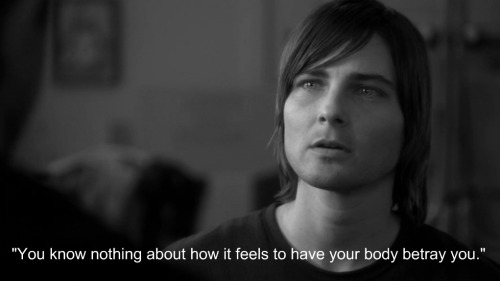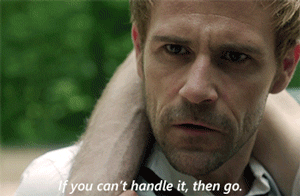Representation is magic. When you see yourself within a character on TV, it feels tangible.
Growing up at the introduction of the internet age, I remember seeing comic book characters come to life on my favorite TV shows, but, the minor difference between actually seeing yourself on TV and seeing a stereotyped figment of yourself on TV may mean the difference between Pansexual/Bisexual erasure and pandering to a straight audience.
Throughout the past two decades of watching TV, I have seen bisexual lives and trans lives scuffed out for watered down heterosexual consumption.
To be honest, it leaves me with this reaction. All. The. Time.

It matters to see myself on TV& this is why Constantine, Xena, and Willow matter to many fans, myself, included.
As a kid, I never saw a pansexual, or bisexual, transgender guy represented well, on TV. They were either killed off, like Adam on Degrassi...

or left without a relationship, once they transitioned, like Max on The L Word.

So, Xena Constantine, and Willow were my only hope in seeing another part of myself, through their eyes.
On their respective TV shows, Constantine and Xena—unlike the comics—have not been able to accurately represent the Pansexual and Bisexual communities well. The subtext on TV isn’t as blatantly made canon as it has been done in their respective comics (however, any fan can tell you that it's there).
As a Pansexual trans man, I wanted to latch onto anything in these shows, hoping that, maybe, just maybe, the writers of these shows are listening.
Surprise...

They weren't.
So, I took as much watered down representation as I could through subtext.
The episodes, of Xena, for example, almost always had an inside joke or a sly wink or two thrown in by the characters to let the fandom surmise that the leads are in a relationship.

In the first few seasons of Xena, she avoids a romantic relationship with Gabrielle because she’s too focused on doing a job (or at least the workaholic nature is a good excuse for why she never followed her heart). However, whenever Gabrielle was the damsel in distress, Xena could barely hide her true feelings for her traveling companion...she just would never admit it, until the later seasons.

In his first few episodes of his season, Constantine similarly dives into his work wholeheartedly to avoid being in a serious relationship, with a sly remark or two on his partnership with each character in the show.
The crisis for each episode drives the plot of the day, and the plot drives the motivations of the characters. Both Xena's and Constantine's motivations for doing what they do best (their job) are connected by feelings of love and respect for their co-leads. Unfortunately, writers—for whatever reason—prefer to show a platonic relationship over a romantic one.


Willow, on the other hand, is an anomaly.
In regards to love and bi-representation, she seems to fit the bill: in the first few seasons of Buffy the Vampire Slayer, she has a relationship with the werewolf rocker, Oz.
 Bi erasure & Refridging, Oz. It's Bi Erasure & Refridging.
Bi erasure & Refridging, Oz. It's Bi Erasure & Refridging.
Yet, when Tara falls in love with her in the series, Willow not only is torn between the two relationships, but is deprived of the label of bi or pan. Instead, when she chooses Tara, at the end of that one episode where both characters appear, she is, henceforth, labeled a lesbian until the end of the series. Their continued relationship gets major brownie points for supporting one part of the LGBT Community, but it also, rather blatantly, ignores another two parts of the same community.
Later, Tara is killed off (rather famously, blatantly, and unceremoniously) by a bullet, and is thus refrigerated for the remainder of her live action role, ceasing any possibility of Willow's continued sexual awakening (this relationship is picked back up in the comics, where Tara is reincarnated as a cat who follows Willow around, until the latter changes her back into her human form).
Similarly, Xena and Gabrielle were both in prior relationships with partners of the opposite gender prior to joining together, yet neither woman is labeled as pansexual or bisexual. This happens time and time again, with Xena (in almost every season) despite numerous longing glances, gentle caresses, and heartfelt declarations to each other. Constantine on other hand, doesn't even get a chance to be interpreted as bisexual on his own TV show!
Instead, he's allowed to thrive in a straight pandering relationship (on the TV show) with no mention of his bisexual history (in the comics) being played onscreen. This missed opportunity was a crushing blow for those of us who need him.
 Not when you aren't being represented, Johnny boy.
Not when you aren't being represented, Johnny boy.
TV shows can and must do better to respectfully, and accurately, represent the pansexual, bisexual, and transgender communities, especially when translating those characters from a glossy, paper, & digital world that is as varied as the readers who read them.
Without proper representation, the characters in these shows and the status they have for those of us who need them, fall flat. TV shows have the potential to expand upon the source material of comics and vice versa; TV executives just give these comic book characters a chance to show on the TV screen what they did on paper.